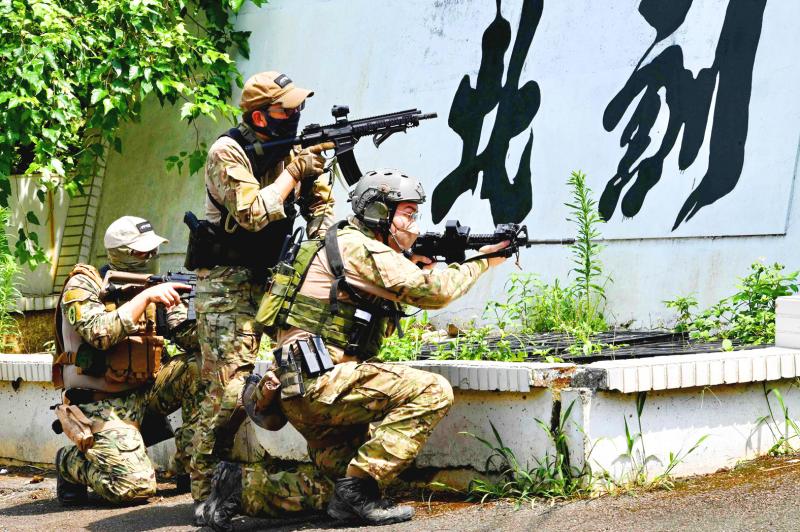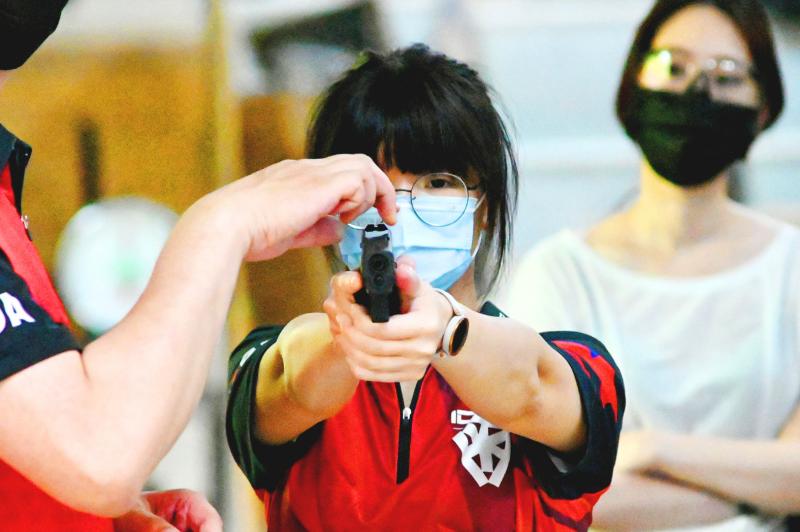Dressed in military camouflage with an assault rifle ready, “prof” Yeh peers from behind a vehicle in a parking lot outside Taipei, scanning his surroundings and waiting for a signal to advance.
Yeh actually works in marketing, and his weapon is a replica — but he is spending the weekend attending an urban warfare workshop to prepare for what he sees as the very real threat of a Chinese invasion.
“The Russia-Ukraine war is a big reason why I came to this workshop,” 47-year-old Yeh, whose call sign during training is prof”, told Agence France-Presse (AFP) during a break between sessions.

Photo: Sam Yeh, AFP
When Russian President Vladimir Putin ordered his troops to invade Ukraine at the end of February, he gave shape to the darkest fears of many Taiwanese.
The nation lives under constant threat from authoritarian China, which views it as part of its territory and has pledged to take it one day.
However, the war in Ukraine has also inspired Yeh.

Photo: Sam Yeh, AFP
The resilience of Ukrainian forces has given him hope that with the right tactics, Taiwan might also have a chance defending itself against its much mightier neighbor.
He is not alone — the organizers of the urban combat course say their students have nearly quadrupled since February. Firearms and first aid courses have also seen increased enrolment.
Disquiet over China was brewing in Taiwan long before the Russian invasion.
Max Chiang, CEO of the company that organizes the workshops, said there has been “a heightened sense of crisis” among Taiwanese since 2020, when Chinese warplanes began making regular incursions into the nation’s air defense identification zone.
About 380 sorties were recorded that year — a number that more than doubled last year and is on track to do so again this year, an AFP database showed.
China comprehensively outnumbers Taiwan’s militarily, with more than 1 million ground force personnel to Taiwan’s 88,000, as well as 6,300 tanks compared with 800 and 1,600 fighter jets to 400 jets, US Department of Defense data showed.
However, Ukraine has provided a practical blueprint for how to make that disparity matter less. It has vividly demonstrated how fighting for control of cities can be difficult and costly for attacking forces — and most of Taiwan’s 23 million people live in urban areas.
As Yeh and his 15 teammates run in staggered column formation across the parking lot, stooping behind dilapidated buildings and vehicles to simulate attacks on enemy positions, they are trying to put some of the lessons learned in Ukraine’s devastated cities into practice.
“The best defense is offense,” Yeh said as instructors in bright reflective vests stand nearby taking notes.
“To put it bluntly, annihilate the enemy and stop any enemy advances,” he said.
In a warehouse beside the parking lot, 34-year-old Ruth Lam is learning to fire a handgun for the first time.
Lam, who works at an emergency vehicle lights manufacturer, said that most of her European clients had told her there would not be a war in Ukraine.
“But it happened,” she said.
She is hoping that knowing how to handle a gun might protect her and her family if China were to start a war, and is planning to continue target practice with friends.
“Prepare your umbrella before it rains,” she said. “We don’t know when things are going to happen.”
A survey conducted in May showed that 61.4 percent of respondents said they were willing to take up arms in the event of an invasion.
“The will of the Ukrainian people to fight against aggressors has increased the resolve of Taiwanese to safeguard their homeland,” Taiwan NextGen Foundation chief executive officer Chen Kuan-ting (陳冠廷) said.
Lin Ping-yu, a former paratrooper who came to the urban warfare class “to brush up on his combat skills,” concurs.
“Only when a country’s citizens have the strong will and determination to protect their land can they convince the international community to come help them,” the 38-year-old said.
Yeh believes it is a question of when, not if, they would be called to put their new skills into action.
Citing the example of Hong Kong, where Beijing has moved to consolidate its grip in the past few years, he simply said: “Taiwan is next.”

Beijing could eventually see a full amphibious invasion of Taiwan as the only "prudent" way to bring about unification, the US Department of Defense said in a newly released annual report to Congress. The Pentagon's "Annual Report to Congress: Military and Security Developments Involving the People's Republic of China 2025," was in many ways similar to last year’s report but reorganized the analysis of the options China has to take over Taiwan. Generally, according to the report, Chinese leaders view the People's Liberation Army's (PLA) capabilities for a Taiwan campaign as improving, but they remain uncertain about its readiness to successfully seize

Taiwan is getting a day off on Christmas for the first time in 25 years. The change comes after opposition parties passed a law earlier this year to add or restore five public holidays, including Constitution Day, which falls on today, Dec. 25. The day marks the 1947 adoption of the constitution of the Republic of China, as the government in Taipei is formally known. Back then the Chinese Nationalist Party (KMT) governed China from Nanjing. When the KMT, now an opposition party in Taiwan, passed the legislation on holidays, it said that they would help “commemorate the history of national development.” That

Taiwan has overtaken South Korea this year in per capita income for the first time in 23 years, IMF data showed. Per capita income is a nation’s GDP divided by the total population, used to compare average wealth levels across countries. Taiwan also beat Japan this year on per capita income, after surpassing it for the first time last year, US magazine Newsweek reported yesterday. Across Asia, Taiwan ranked fourth for per capita income at US$37,827 this year due to sustained economic growth, the report said. In the top three spots were Singapore, Macau and Hong Kong, it said. South

Snow fell on Yushan (Jade Mountain, 玉山) yesterday morning as a continental cold air mass sent temperatures below freezing on Taiwan’s tallest peak, the Central Weather Administration (CWA) said. Snowflakes were seen on Yushan’s north peak from 6:28am to 6:38am, but they did not fully cover the ground and no accumulation was recorded, the CWA said. As of 7:42am, the lowest temperature recorded across Taiwan was minus-5.5°C at Yushan’s Fengkou observatory and minus-4.7°C at the Yushan observatory, CWA data showed. On Hehuanshan (合歡山) in Nantou County, a low of 1.3°C was recorded at 6:39pm, when ice pellets fell at Songsyue Lodge (松雪樓), a